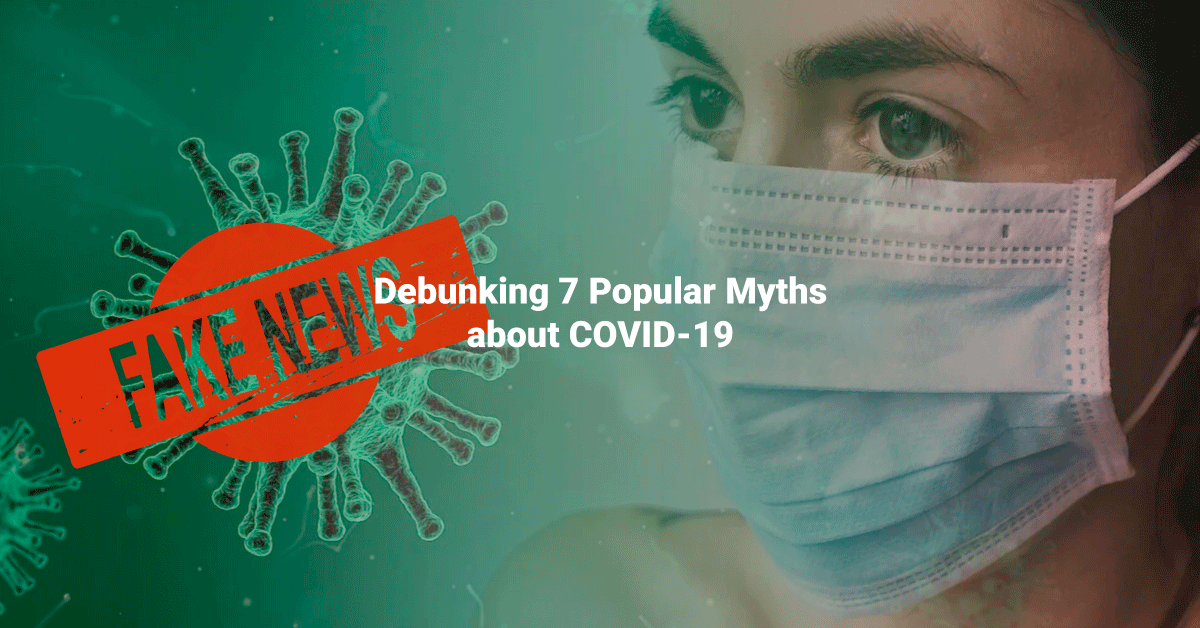Along with the current outbreak of the COVID-19 in our country, there has also been a spread of myths and “fake news” about this disease all over social media and word of mouth. Especially now in a state of public health emergency, there is no place for misinformation which can be misleading, induce fear, and be potentially dangerous.
Aside from practicing preventive measures like home quarantine and frequent washing of hands, our best arm against this disease is being informed. It pays to fully understand what the COVID-19 disease is and what it is not, so we can properly prepare and protect ourselves and our loved ones from the virus.
Here we debunk 7 of the popular myths going around about the coronavirus and see for ourselves where they lie on the fact-to-folly scale.
Myth #1: The coronavirus is transmitted only in areas with cold climates.
The coronavirus can be transmitted in all areas, regardless of climate. There have been reported cases in both cold and hot regions all over the world. It is important that wherever you are located, you should adopt the suggested preventive measures to protect yourself from getting the virus.
Myth #2: The coronavirus can be transmitted through mosquitos.
COVID-19 is a respiratory disease that is primarily transmitted through close contact with another person, NOT through mosquito bites. Respiratory droplets containing the virus from when an infected person coughs or sneezes may enter the body through the mouth or nose.
Myth #3: Your pets can contract and spread the coronavirus.
Animals can potentially contract the virus from people, like one case in China where a dog got a “low-level” infection from their COVID-19-positive owner. However, dogs will not get sick or show any symptoms of the disease, and there is no evidence so far that they could infect humans with the virus.
During the similar SARS outbreak in 2003, several pet dogs and cats tested positive for the SARS virus, but none of them showed any symptoms for the disease. Additionally, there were no cases of viral transmission from pets to humans. So, it is perfectly safe to cuddle your pets during this outbreak, so long as you wash your hands after.
Myth #4: Face masks can protect you from getting the virus.
It is perfectly understandable for people to wear face masks when going out because it gives them a sense of security and protection against the virus. However, standard drugstore surgical masks are not designed to block small virus particles from entering your passageways. What face masks can do is to prevent infected people from spreading the virus to others by blocking the respiratory droplets when they cough or sneeze.
Therefore, if you are a healthy individual, it is advised to not wear masks to prevent running out of masks for those in need. Surgical masks should be reserved for those who are sick or are taking care of someone who is sick.
Myth #5: Spraying alcohol all over your body kills the coronavirus.
This is not recommended at all. Alcohol, bleach, and other antiseptics cannot do anything about the virus once it has entered the body. Spraying these solutions may even be harmful to your body, especially to your eyes, mouth, and skin.
Instead, use these antiseptic solutions to disinfect possibly contaminated surfaces. Use alcohol/hand sanitizer (with at least 70% alcohol) to disinfect your hands.
Myth #6: Taking Vitamin C (and other food supplements) will protect you from catching COVID-19.
This myth probably arose from the idea that Vitamin C makes people immune to the flu virus (which is a myth itself). There is no evidence so far showing that Vitamin C is an effective agent against COVID-19. The same goes for a lot of products circulating in social media claiming to protect against the virus, like garlic, green tea, and saline water.
With that said, Vitamin C is an important part of our diet that can help boost our immune system. Instead of focusing on a single miracle product, we should try to maintain a healthy and well-rounded diet that strengthens our defenses against the coronavirus.
Myth #7: Antibiotics and pneumonia vaccines are effective in preventing and treating COVID-19.
COVID-19 is caused by a virus, and antibiotics – which only work against bacteria – will not be able to kill the coronavirus. Therefore, taking antibiotics is not recommended because this can potentially make our drugs weaker when there is an actual bacterial infection.
Existing pneumonia vaccines will also not work against the virus. The novel coronavirus is so new and different that we need a completely new vaccine against it.
There are currently no vaccines available yet against COVID-19. There is a worldwide effort from researchers and scientists to develop a vaccine, with massive support from governments and the WHO.
A big part of protecting yourselves is knowing what you are protecting yourselves from. During this COVID-19 outbreak, be smart and be critical of the things you read or hear about the coronavirus. Our knowledge is a necessary shield to keep our homes safe from the virus.
